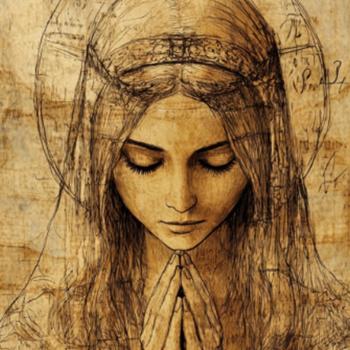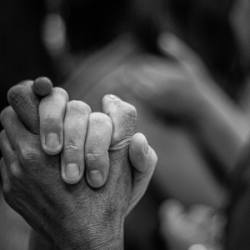Aside from the fact that I wouldn't be here had I been aborted, another concern I think about is what would've happened to my parents, especially considering that I am their only child. You see, my mother's health eventually began to fail because of the MS (she became paralyzed from the waist down when I was six), and my father would later struggle with diabetes and kidney failure.
Now I'm not saying I was or am the perfect daughter, or even that I was there for my parents as much as I should've been; I certainly remember being very selfish at times, and forgetting how much they sacrificed for me. But looking back I can see how my presence and own contribution to the family must have eased the situation.
I believe that, while the law and science viewed my existence as a problem to be solved, God knew exactly what He was doing. This could be said of many "unplanned" pregnancies—we never know what lies ahead, and a child can be a source of support and strength when health fails and suffering begins.
My father's willingness to be a caretaker, and my mom's resilience and positive attitude in the face of paralysis, was another pro-life witness that I carry with me. When speaking about the pro-life movement, we speak not just of the unborn, but of all people at all stages of life. Being pro-life means having a sense of the sacredness of human life, and treating each person as they deserve to be treated—as an unrepeatable gift from God, as someone who was sent here on a particular mission that has been entrusted only to them.
The fact is, I could never repay my parents for the gift of life they gave me, and one of my "missions" in this life is to follow God's call in the Book of Sirach: "My son, take care of your father when he is old; grieve him not as long as he lives. Even if his mind fail, be considerate with him; revile him not in the fullness of your strength. For kindness to a father will not be forgotten . . ." (Sirach 3:12-14).
We should also remember that God Himself chose to come to us through the womb of a woman. Didn't we just celebrate Christmas less than a month ago and recall this miracle? Just as we see Jesus in the poor, the sick, and the suffering, we also see Jesus in the unborn, since He, too, was unborn in the womb and went through the same process of development that we did. That is where Jesus' life began, and that is where all human life begins. Those "clump of cells" are not going to grow to be a chicken or a cow—we know what they will be—they are just in the very early stages of human development. That does not make them less human.
How often have we heard the rally cry "My body, my choice" from supporters of abortion? While these women are saying, "This is my body, to do with what I want," Jesus says, "This is my body which will be given up for you." Think about that contrast.
Using abortion as a response to poverty, rape, or medical illnesses is simply answering one evil or injustice with another evil and injustice. It doesn't negate the problem, even if it temporarily relieves an illness, and causes more problems than what proponents believe it "solves," beginning with the loss of an innocent life. What is needed is true compassion and real assistance, both for the woman and the child. I say this having known women who have suffered the effects of having an abortion, and as someone who has tried to back up my pro-life words with actions.
This year, the anniversary of Roe v. Wade falls on a Saturday, a non-work day for Congress. Because of this, the March for Life has been moved to Monday, January 24th, which also would have been my mother's 61st birthday. Although she passed away in 2006, following complications from MS, I can imagine she will be at the March in spirit, praying that women today will recognize the Truth that she did—that life begins at conception, and is worth the sacrifice.




